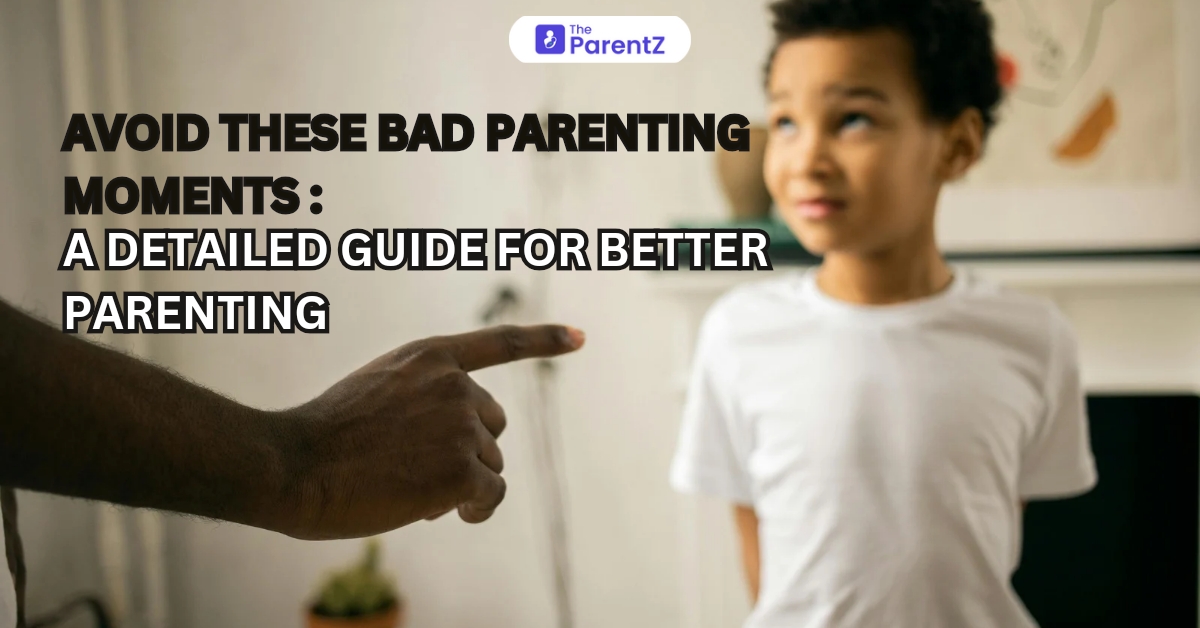Parenting is a journey filled with challenges and rewards. While no parent is perfect, recognizing and avoiding certain “bad parenting” moments can significantly enhance your relationship with your child and foster a positive home environment. This detailed guide will help you identify common parenting pitfalls and provide strategies to avoid them, ensuring you provide the best upbringing for your children.
Why Avoiding Bad Parenting Moments is Crucial
Understanding the impact of negative parenting practices is essential:
- Affects Child Development: Negative interactions can hinder emotional, social, and cognitive development.
- Strains Relationships: Poor parenting habits can create a rift between you and your child.
- Encourages Negative Behavior: Inconsistent or negative parenting can lead to behavioral issues in children.
- Reduces Self-Esteem: Negative interactions can damage a child’s self-worth and confidence.
Common Bad Parenting Moments and How to Avoid Them
1. Inconsistent Discipline
Inconsistency in rules and consequences can confuse children and lead to behavioral issues.
How to Avoid:
- Set Clear Rules: Establish clear, consistent rules and consequences.
- Follow Through: Ensure that you consistently enforce these rules.
- Be Fair: Make sure the consequences are fair and appropriate for the behavior.
2. Ignoring Positive Behaviour
Focusing only on negative behavior and ignoring positive actions can demotivate children.
How to Avoid:
- Praise Positively: Regularly acknowledge and praise your child’s positive behavior.
- Be Specific: Instead of saying “Good job,” specify what they did well, like “I’m proud of you for sharing your toys.”
- Encourage Effort: Recognize and encourage the effort they put in, not just the outcome.
3. Overreacting to Mistakes
Overreacting or getting angry over mistakes can create fear and anxiety in children.
How to Avoid:
- Stay Calm: Maintain a calm demeanor when addressing mistakes.
- Use Mistakes as Learning Opportunities: Help your child understand what went wrong and how they can improve.
- Encourage Problem-Solving: Encourage them to think about solutions and ways to avoid similar mistakes in the future.
4. Lack of Quality Time
Failing to spend quality time with your children can make them feel neglected and unimportant.
How to Avoid:
- Schedule Regular Time Together: Make it a priority to spend quality time with your child daily, even if it’s just a few minutes.
- Engage in Activities They Enjoy: Participate in activities that interest your child to strengthen your bond.
- Be Present: Focus entirely on your child during this time, avoiding distractions like phones or TV.
5. Being Overly Critical
Constant criticism can damage a child’s self-esteem and make them feel inadequate.
How to Avoid:
- Balance Feedback: Balance constructive criticism with positive feedback.
- Focus on Behavior, Not the Child: Critique the behavior, not the child. For example, say, “Leaving your toys out makes it hard to walk around” instead of “You’re so messy.”
- Encourage Self-Improvement: Motivate your child to improve by setting realistic goals and celebrating progress.
6. Not Setting Boundaries
A lack of boundaries can lead to insecurity and behavioral problems.
How to Avoid:
- Set Clear Expectations: Clearly communicate your expectations and the reasons behind them.
- Be Consistent: Consistently enforce the boundaries you set.
- Explain the Why: Help your child understand why boundaries are important for their safety and well-being.
7. Comparing Your Child to Others
Comparisons can make children feel inadequate and resentful.
How to Avoid:
- Celebrate Individuality: Appreciate and celebrate your child’s unique qualities and strengths.
- Avoid Comparisons: Focus on your child’s progress and achievements without comparing them to siblings or peers.
- Encourage Personal Best: Encourage your child to strive for their personal best rather than competing with others.
8. Using Harsh Punishments
Harsh punishments can lead to fear and resentment, damaging your relationship with your child.
How to Avoid:
- Use Positive Discipline: Focus on teaching and guiding rather than punishing.
- Natural Consequences: Allow natural consequences to teach lessons where appropriate.
- Time-Outs and Calm Discussions: Use time-outs and calm discussions to address inappropriate behavior.
9. Not Listening to Your Child
Ignoring your child’s thoughts and feelings can make them feel undervalued and misunderstood.
How to Avoid:
- Active Listening: Practice active listening by giving your full attention and acknowledging their feelings.
- Encourage Open Communication: Create an environment where your child feels safe to express themselves.
- Validate Their Feelings: Even if you don’t agree, validate your child’s feelings and show empathy.
10. Being Overprotective
Overprotectiveness can hinder a child’s independence and problem-solving skills.
How to Avoid:
- Encourage Independence: Allow your child to try new things and solve problems on their own.
- Provide Support: Offer guidance and support, but let them take the lead.
- Teach Responsibility: Give them age-appropriate responsibilities to foster independence.
Conclusion
Avoiding these bad parenting moments involves self-awareness, patience, and a commitment to positive parenting practices. By recognizing and addressing these common pitfalls, you can create a nurturing and supportive environment that promotes your child’s overall well-being and strengthens your parent-child relationship.






Be the first one to comment on this story.